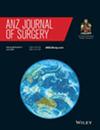Follow-Up Strategies in Colorectal Cancer: What Do Patients Prefer?
Abstract
Background
Increasing numbers of colorectal cancer patients and healthcare constraints mean novel follow-up strategies need to be considered. The optimal method of follow-up is unclear; however, a patient-tailored model could reduce costs, improve patient experience, and improve overall health. The aim was to explore patients' perspectives on current and alternative follow-up strategies and barriers to follow-up, to create a patient-led framework to guide further development of colorectal cancer follow-up.
Methods
A qualitative study was conducted using semi-structured interviews with patients who underwent curative-intent colorectal cancer surgery. Thirteen participants (seven women, five Māori, age range 41–86 years) were recruited in Northland. Thematic analysis was performed using the Braun and Clarke method.
Results
Patients were mostly satisfied and experienced positivity and reassurance around follow-up visits. Patients were open to alternative methods of follow-up. Benefits of remote follow-up included convenience, familiarity with prior experience, and resource-saving, while reservations included lack of physical contact, inability to use technology, and higher thresholds to raise concerns. Reservations of GP follow-up included lack of continuity, feeling rushed, misdiagnosis, and difficulty accessing care. Barriers to follow-up included inaccessibility, disability, travel, and obligations, while enablers included social support and access to transport.
Conclusion
Colorectal cancer patients have positive experiences of follow-up, with alternative modalities for follow-up being feasible. While barriers need to be addressed, some could be overcome by a patient-tailored model of follow-up.


 求助内容:
求助内容: 应助结果提醒方式:
应助结果提醒方式:


